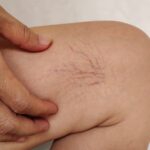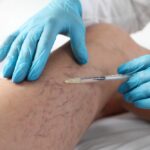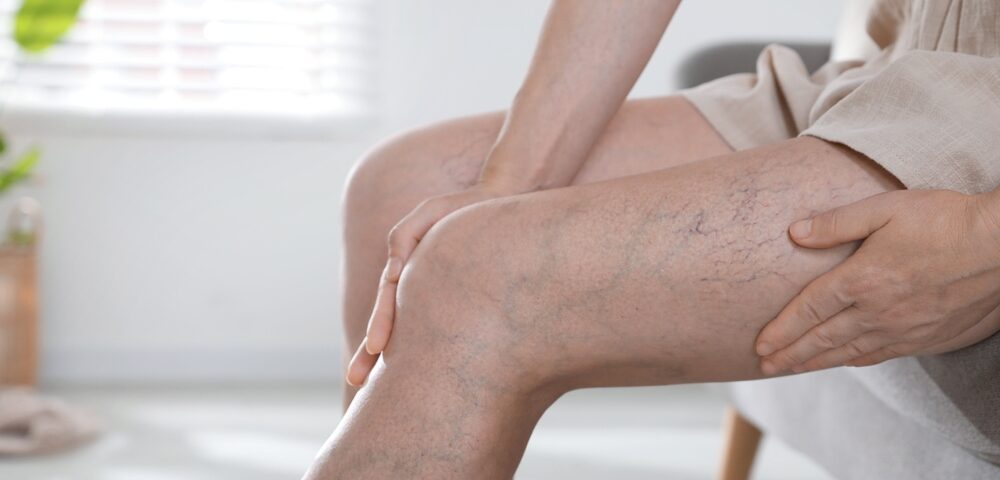
The Best Vein Doctor in Cockeysville, MD: When Expertise Meets Compassion
August 13, 2024
How Do I Find the Right Spider Vein Doctor in Owings Mills, Maryland?
August 15, 2024While typically only a cosmetic concern, varicose veins can also cause a great deal of discomfort. If ignored, they can significantly impact your quality of life.
Let’s answer, “Why do my varicose veins hurt,” plus delve into specific symptoms and treatments to get you comfortably and safely back on your feet without pain!
What Causes Varicose Veins?
Veins have one-way valves that ensure blood flows in a single direction. When vein walls stretch and lose their elasticity, these valves can weaken. A weakened valve may allow blood to flow backward, leading to accumulation and swelling in the veins. This issue commonly affects veins farthest from the heart.
Common causes of varicose veins include:
- Aging
- Genetics / family history
- Hormonal changes due to pregnancy, menopause, or hormonal therapy
- Increased blood volume and pressure on veins
- Obesity
- Prolonged standing, sitting, extended periods of immobility
- Repeated heavy lifting
- Sedentary lifestyle
- Straining from chronic constipation
- Previous vein injuries
Why Do My Varicose Veins Hurt?
These visible, bulging veins may appear twisted or swollen. Symptoms often include a heavy or aching feeling in the legs, especially after prolonged standing or sitting. Additionally, you might experience itching or cramping, along with swelling in the lower legs.
In more severe cases, skin changes or ulcers near the affected veins can occur, which can cause pain. Additionally, reduced blood flow from improperly working veins can cause discomfort
Can You Tell Me How They Are Diagnosed and Treated?
Sure!
Varicose veins are typically diagnosed through a combination of a physical exam and imaging techniques. During a physical exam, a vein doctor will inspect your legs for visible signs of varicose veins. They may also ask about your current health conditions, medications, lifestyle, and symptoms.
To confirm the diagnosis and assess the severity, a Doppler ultrasound is often used. This imaging technique provides a detailed view of the veins and helps identify any abnormalities in blood flow or valve function. A plan for treatment is based on the findings of your overall health, exam, and test.
For mild cases, lifestyle changes such as regular exercise, weight management, and the wearing of compression stockings may be recommended to alleviate symptoms and improve circulation. These measures may be combined with medical procedures.
Sclerotherapy involves injecting a solution into the affected veins, causing them to collapse and fade over time. Laser therapy and radiofrequency ablation are other minimally invasive procedures that use heat to close off problematic veins.
Serious cases may require surgical procedures like vein stripping to remove or tie off the affected veins. Each treatment plan is tailored to the individual’s needs, aiming to reduce symptoms and improve overall vein health.
What Can I Do to Prevent Varicose Veins?
You have an answer to your question, “Why do my varicose veins hurt,” and under the guidance of a qualified doctor, there are steps you can take to prevent them. Most importantly is a healthy lifestyle.
Regular exercise, such as walking or swimming, helps strengthen leg muscles and improve blood flow. Maintain a healthy weight to reduce pressure on veins, and avoid standing or sitting for long periods without movement.
A diet high in fiber and low in salt can help prevent conditions like chronic constipation, which can contribute to vein pressure.
Elevating the legs periodically can also aid circulation. Wear compression stockings if recommended by a healthcare provider to support vein function.
It’s Time to Discover How The Vein Center of Maryland Can Help You!
Don’t leave your vein health to chance. Contact us at 410-970-2314 to book your FREE consultation, and let’s work together to develop a treatment plan designed to elevate your health and happiness.
Our team has years of experience in treating varicose veins. We also make it a priority to stay current on the latest technology and procedures to ensure our patients get the best care possible!



